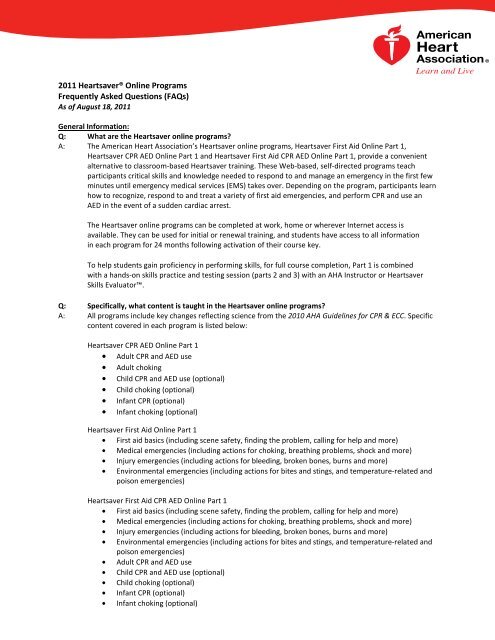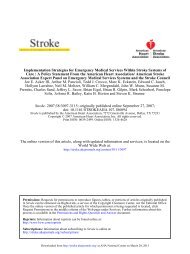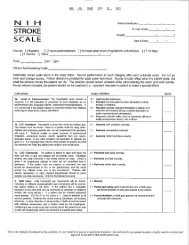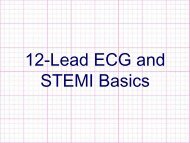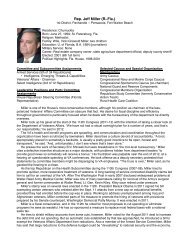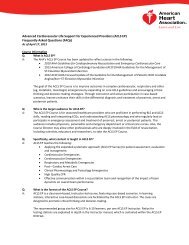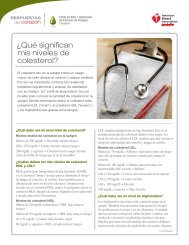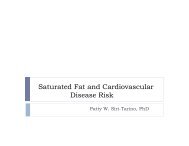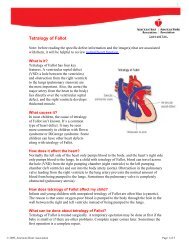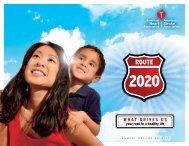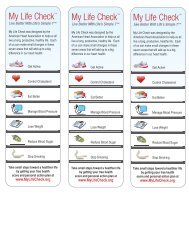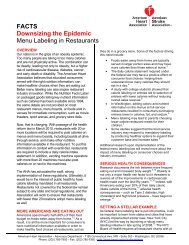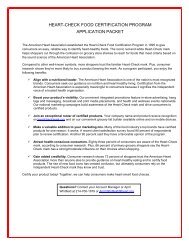Heartsaver Online Frequently Asked Questions - American Heart ...
Heartsaver Online Frequently Asked Questions - American Heart ...
Heartsaver Online Frequently Asked Questions - American Heart ...
Create successful ePaper yourself
Turn your PDF publications into a flip-book with our unique Google optimized e-Paper software.
2011 <strong><strong>Heart</strong>saver</strong>® <strong>Online</strong> Programs<br />
<strong>Frequently</strong> <strong>Asked</strong> <strong>Questions</strong> (FAQs)<br />
As of August 18, 2011<br />
General Information:<br />
Q: What are the <strong><strong>Heart</strong>saver</strong> online programs?<br />
A: The <strong>American</strong> <strong>Heart</strong> Association’s <strong><strong>Heart</strong>saver</strong> online programs, <strong><strong>Heart</strong>saver</strong> First Aid <strong>Online</strong> Part 1,<br />
<strong><strong>Heart</strong>saver</strong> CPR AED <strong>Online</strong> Part 1 and <strong><strong>Heart</strong>saver</strong> First Aid CPR AED <strong>Online</strong> Part 1, provide a convenient<br />
alternative to classroom-based <strong><strong>Heart</strong>saver</strong> training. These Web-based, self-directed programs teach<br />
participants critical skills and knowledge needed to respond to and manage an emergency in the first few<br />
minutes until emergency medical services (EMS) takes over. Depending on the program, participants learn<br />
how to recognize, respond to and treat a variety of first aid emergencies, and perform CPR and use an<br />
AED in the event of a sudden cardiac arrest.<br />
The <strong><strong>Heart</strong>saver</strong> online programs can be completed at work, home or wherever Internet access is<br />
available. They can be used for initial or renewal training, and students have access to all information<br />
in each program for 24 months following activation of their course key.<br />
To help students gain proficiency in performing skills, for full course completion, Part 1 is combined<br />
with a hands-on skills practice and testing session (parts 2 and 3) with an AHA Instructor or <strong><strong>Heart</strong>saver</strong><br />
Skills Evaluator.<br />
Q: Specifically, what content is taught in the <strong><strong>Heart</strong>saver</strong> online programs?<br />
A: All programs include key changes reflecting science from the 2010 AHA Guidelines for CPR & ECC. Specific<br />
content covered in each program is listed below:<br />
<strong><strong>Heart</strong>saver</strong> CPR AED <strong>Online</strong> Part 1<br />
• Adult CPR and AED use<br />
• Adult choking<br />
• Child CPR and AED use (optional)<br />
• Child choking (optional)<br />
• Infant CPR (optional)<br />
• Infant choking (optional)<br />
<strong><strong>Heart</strong>saver</strong> First Aid <strong>Online</strong> Part 1<br />
• First aid basics (including scene safety, finding the problem, calling for help and more)<br />
• Medical emergencies (including actions for choking, breathing problems, shock and more)<br />
• Injury emergencies (including actions for bleeding, broken bones, burns and more)<br />
• Environmental emergencies (including actions for bites and stings, and temperature-related and<br />
poison emergencies)<br />
<strong><strong>Heart</strong>saver</strong> First Aid CPR AED <strong>Online</strong> Part 1<br />
• First aid basics (including scene safety, finding the problem, calling for help and more)<br />
• Medical emergencies (including actions for choking, breathing problems, shock and more)<br />
• Injury emergencies (including actions for bleeding, broken bones, burns and more)<br />
• Environmental emergencies (including actions for bites and stings, and temperature-related and<br />
poison emergencies)<br />
• Adult CPR and AED use<br />
• Child CPR and AED use (optional)<br />
• Child choking (optional)<br />
• Infant CPR (optional)<br />
• Infant choking (optional)
Q: Who is the target audience for the <strong><strong>Heart</strong>saver</strong> <strong>Online</strong> programs?<br />
A: <strong><strong>Heart</strong>saver</strong> courses are for anyone with limited or no medical training who needs a course completion<br />
card in first aid and/or CPR AED to meet job, regulatory or other requirements and is seeking an<br />
alternative to classroom-based training.<br />
Q: What is the format for these programs?<br />
A: <strong><strong>Heart</strong>saver</strong> online programs present cognitive information through interactive content, exercises and<br />
videos. Upon successful completion of Part 1, a Part 1 certificate of completion is available for<br />
students to print. This certificate must be presented for Parts 2 and 3, the hands-on skills practice and<br />
testing session with an AHA Instructor or <strong><strong>Heart</strong>saver</strong> Skills Evaluator. Upon successful completion of<br />
all three parts, students receive an AHA <strong><strong>Heart</strong>saver</strong> course completion card, valid for two years.<br />
Q: What are some of the unique features of the <strong><strong>Heart</strong>saver</strong> online programs?<br />
A: Course features include:<br />
• Includes online content, interactive exercises and videos<br />
• Certificate of completion available to print when Part 1 has been completed successfully<br />
• Progress bar at top of course screen and check-mark icons next to each exercise indicate students’<br />
progress through course<br />
• Course features application for taking and referencing notes<br />
• “Drag and drop” tool reinforces steps and sequences and offers student interactivity<br />
• Accordion-style content navigation allows for less scrolling<br />
• Screen and text-sized options help meet diverse learning needs<br />
• Navigation controls allow user to move easily through content<br />
• Audio available<br />
• Students have access to all information in the online program for 24 months following activation of<br />
their course key<br />
Q: Approximately how long do the <strong><strong>Heart</strong>saver</strong> online programs take to complete?<br />
A: The following are the approximate completion times for each online part 1 program. Time to complete<br />
skills sessions vary.<br />
• <strong><strong>Heart</strong>saver</strong> First Aid <strong>Online</strong> Part 1: approximately 1 – 1 ½ hours<br />
• <strong><strong>Heart</strong>saver</strong> CPR AED <strong>Online</strong> Part 1: approximately 30 minutes – 1 hour<br />
• <strong><strong>Heart</strong>saver</strong> First Aid CPR AED <strong>Online</strong> Part 1: approximately 1 ½ – 2 ½ hours<br />
Q: Does successful completion of a <strong><strong>Heart</strong>saver</strong> online program result in receipt of an AHA course<br />
completion card? If so, what card?<br />
A: Upon successful completion of all three parts (online program, plus skills practice and testing session),<br />
students will receive a <strong><strong>Heart</strong>saver</strong> course completion card. Each card is valid for two years. The table<br />
below indicates the card received for each program:<br />
Course<br />
<strong><strong>Heart</strong>saver</strong> First Aid <strong>Online</strong> Part 1<br />
<strong><strong>Heart</strong>saver</strong> CPR AED <strong>Online</strong> Part 1<br />
<strong><strong>Heart</strong>saver</strong> First Aid CPR AED <strong>Online</strong> Part 1<br />
Card Received<br />
<strong><strong>Heart</strong>saver</strong> First Aid course completion card<br />
<strong><strong>Heart</strong>saver</strong> CPR AED course completion card<br />
<strong><strong>Heart</strong>saver</strong> First Aid CPR AED course completion card<br />
2
Q: Is there a written test that must be completed for each <strong><strong>Heart</strong>saver</strong> online part 1 program?<br />
A: No, the <strong><strong>Heart</strong>saver</strong> online programs do not include a written test. The programs do include review<br />
questions at the end of each section, but these questions are not test questions. While the 2006 version<br />
of these programs included review/test questions, the 2011 programs do not.<br />
The AHA does not mandate completion of a written test for <strong><strong>Heart</strong>saver</strong> courses; however, an optional<br />
written test has been developed for Instructors to administer to students whose employers require<br />
completion of a written test. This test can be obtained by Training Center Coordinators, upon request,<br />
from the AHA Customer Support Center (888-CPR-LINE/888-277-5463).<br />
Instructors who need to issue the <strong><strong>Heart</strong>saver</strong> optional written test should issue it to students during the<br />
in-person skills practice and testing session (Parts 2 and 3).<br />
Q: Do the <strong><strong>Heart</strong>saver</strong> online programs offer continuing education (CE/CME)?<br />
A: No, CE/CME credits are not offered for these online programs.<br />
Q: After completion of the online program, how long does a student have to complete the skills session?<br />
A: Students are allowed up to 60 days after the completion of the online part of the course to complete the<br />
skills session.<br />
Q: Can a student log in and out of the course?<br />
A: Yes. Students can log in and out as many times as they choose. To log out, students must click the "Click<br />
here to logout" link located at the top of the page after login. When the student is ready to continue<br />
training, he/she can return to <strong>Online</strong>AHA.org and login with his/her registered email and password.<br />
Q: Can course material be accessed after the online portion is completed?<br />
A: Yes, students may access all material included in the <strong><strong>Heart</strong>saver</strong> online programs for 24 months following<br />
initial activation of their course key.<br />
Information for AHA Instructors and <strong><strong>Heart</strong>saver</strong> Skills Evaluators<br />
Q: Who can conduct skills sessions for the <strong><strong>Heart</strong>saver</strong> online programs?<br />
A: The skills practice and testing session (Parts 2 and 3) may be conducted by AHA Basic Life Support (BLS) or<br />
<strong><strong>Heart</strong>saver</strong> Instructors or <strong><strong>Heart</strong>saver</strong> Skills Evaluators.<br />
Q: What materials do Instructors or Skills Evaluators need to conduct the skills session for the <strong><strong>Heart</strong>saver</strong><br />
online programs?<br />
A: Information for Instructors and <strong><strong>Heart</strong>saver</strong> Skills Evaluators conducting <strong><strong>Heart</strong>saver</strong> skills practice and<br />
testing sessions can be found in the document (dated 6/1/11), “ Training Memo: BLS for Healthcare<br />
Providers and <strong><strong>Heart</strong>saver</strong>® eLearning Courses – Skills Practice and Skills Testing Requirements.” This<br />
document is posted on the AHA Instructor Network at the path Courses > <strong><strong>Heart</strong>saver</strong> eLearning Courses.<br />
Under each eLearning course listing, the memo is posted under the “Instructor Materials” tab.<br />
Q: How can Instructors and <strong><strong>Heart</strong>saver</strong> Skills Evaluators verify the authenticity of Part 1 Certificates of<br />
Completion for the <strong><strong>Heart</strong>saver</strong> online programs?<br />
A: Instructors can verify certificates at <strong>Online</strong>AHA.org under the “Skills Session” tab on the home page.<br />
Purchasing Materials/Finding Skills Sessions:<br />
Q: Where/how can I purchase <strong><strong>Heart</strong>saver</strong> online keys?<br />
A: The <strong><strong>Heart</strong>saver</strong> online programs can be purchased on <strong>Online</strong>AHA.org or from any of ECC’s three trusted<br />
product Distributors (Channing Bete, Laerdal, and World Point). Following are the product numbers for<br />
each program:<br />
• <strong><strong>Heart</strong>saver</strong> First Aid <strong>Online</strong> Part 1:90-1400<br />
• <strong><strong>Heart</strong>saver</strong> CPR AED <strong>Online</strong> Part 1:90-1402<br />
• <strong><strong>Heart</strong>saver</strong> First Aid CPR AED <strong>Online</strong> Part 1: 90-1401<br />
3
Q: How should students or employers schedule a skills session?<br />
A: To find a <strong><strong>Heart</strong>saver</strong> skills session, students can use the ECC Class Connector Tool at<br />
www.heart.org/eccclassconnector.<br />
If an employer provides course keys to employees, the employer should provide students with<br />
information about skills sessions. Regular sessions may be scheduled by Training Centers to provide skills<br />
sessions for the students they provide keys for and to accommodate the single user who has purchased a<br />
key online. Training Center may charge a fee for conducting sessions and issuing cards. For a list of local<br />
Training Centers, visit the ECC Class Connector at www.heart.org/eccclassconnector.<br />
Translations:<br />
Q: Will the <strong><strong>Heart</strong>saver</strong> online programs be translated? Into what languages will they be translated? When<br />
will translated editions be available?<br />
A: Currently, there are no translations planned for the <strong><strong>Heart</strong>saver</strong> online programs.<br />
Technical Issues:<br />
Q: Who should I contact if I have problems with the <strong><strong>Heart</strong>saver</strong> online programs?<br />
A: For problems with these programs, contact <strong>Online</strong>AHA.org technical support at 888.AHA.8883 or via email<br />
at help@onlineaha.org. Customer support is available 9:00 a.m. – 5:00 p.m., Eastern Time, Monday –<br />
Friday.<br />
Q: Do the <strong><strong>Heart</strong>saver</strong> online programs require special computer or support software?<br />
A: <strong>Online</strong>AHA.org recommends using the following setting to maximize your eLearning experience. In<br />
addition, student and administrator hardware should be the recommended requirements.<br />
Recommended Computer Requirements<br />
Bandwidth<br />
Connection<br />
Operating System<br />
Processor Speed<br />
RAM<br />
Web Browser<br />
Plug-Ins<br />
Speakers/Headphones<br />
Soundcard<br />
Plug-ins<br />
Flash<br />
QuickTime<br />
Adobe Acrobat<br />
240 Kb/s (30 KB/s) per user<br />
Broadband/T1/Cable/DSL<br />
At least Windows 2000 or later.<br />
500+ MHz Pentium<br />
256+ MB RAM<br />
Internet Explorer 7 or above<br />
Flash 6 or above<br />
Recommended<br />
Recommended<br />
Macromedia Flash (latest version), available for free at<br />
www.adobe.com/downloads<br />
QuickTime Plugin (4.0 or above) If Quicktime is your<br />
preference, you can download the latest version<br />
www.apple.com/quicktime/download<br />
Adobe Acrobat Reader (latest version) — Available for free<br />
at www.adobe.com/downloads<br />
4


